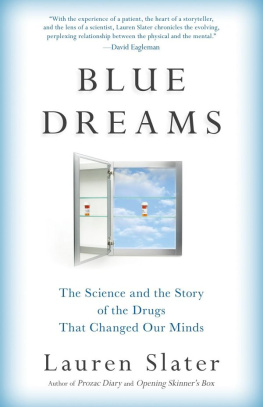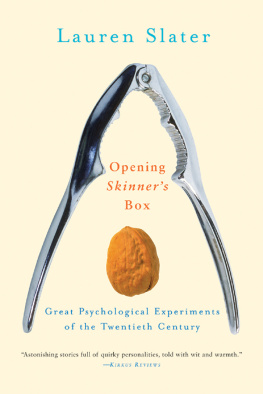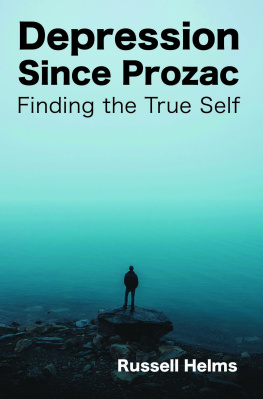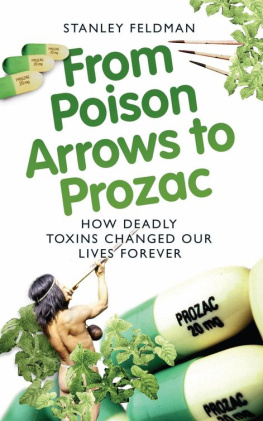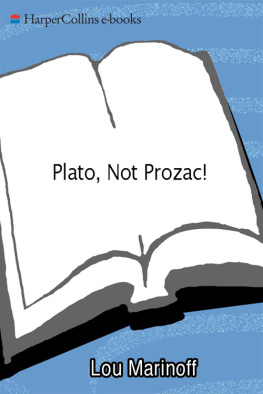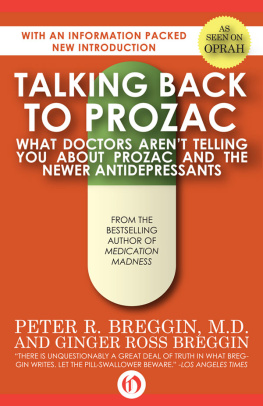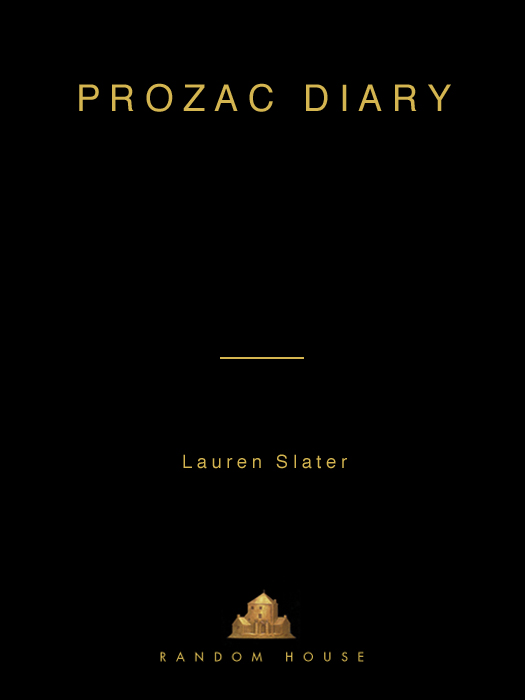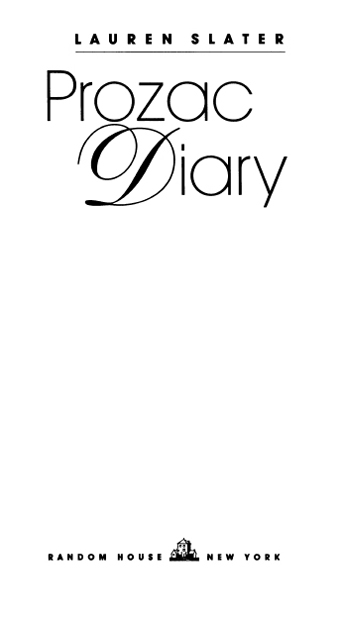ALSO BY LAUREN SLATER
Welcome to My Country
Copyright 1998 by Lauren Slater
All rights reserved under International and Pan-American
Copyright Conventions. Published in the United States by
Random House, Inc., New York
by Random House of Canada Limited, Toronto.
Grateful acknowledgment is made to PolyGram Music
Publishing for permission to reprint four lines from
I Will Survive by Frederick J. Perren and Dino Fekaris.
Copyright 1978 by PolyGram International Publishing, Inc.,
and Perren-Vibes Music, Inc. All rights reserved.
Used by permission.
Library of Congress Cataloging-in-Publication Data
Slater, Lauren.
Prozac diary / Lauren Slater.
p. cm.
eISBN: 978-0-679-46279-8
1. Slater, Lauren. 2. Mentally illUnited StatesBiography.
3. Fluoxetine. 4. Mental illnessChemotherapyCase studies.
I. Title.
RC464.S58A3 1998 616.890092dc21
[B] 97-35727
Random House website address: www.randomhouse.com
v3.1
FOR YOU, BEN.
With the exception of Dr. Bruce Alexander, the names of the characters in this memoir have been changed, as have some details about them and the events recounted here.
ACKNOWLEDGMENTS
Karen Propp read every version of this manuscript, and I dont think I could have completed it without her kindness and intelligence. Nadine Boughton and Pagan Kennedy were keen critics and great company on Thursday nights. Lisa Schiffman listened to drafts long-distance; David Fore, Jennifer Coon, Lisa Tucker, Tracy Slater, Audrey Schulman, and Molly Froelichs comments were helpful throughout. AfterCare Services, my place of employment, granted me the scheduling flexibility to be able to work on this book. As usual, Elizabeth Gravers ongoing support is part of the foundation on which much of my writing rests.
I am grateful to have as my agent Kimberly Witherspoon, and her associates Maria Massie, Josh Greenhut, and Gideon Weil. I am also grateful, and lucky, to have as my editor Kate Medina, to whom I owe much thanks.
Contents
WHERE HE WAITS
T o get there, you turn left off the highway and drive down the road bordered on one side by pasture. And then, a radio song or so later, you turn right into the hospitals gated entrance, easing your car up the slope that leads to the turreted place where he waits. Safety screens cover all the windows. The stairs are steep, and exit signs cast carmine shadows on the concrete floors. Four flights you must travel, and then down several serpentine corridors, before you finally come to his office.
I had never been here before. I had never heard the word Prozac before. It was 1988, the drug just released. I was to be one of the first to take Prozac, and, even though I didnt know this then, one of the first to stay on it for the next ten years, experiencing what long-term existence on this new medication is actually like.
The Prozac Doctor is a busy man. He sees thirty, forty, sometimes fifty patients a day. He is handsome in ways you dont expect your medicine man to be. He has shining black hair and beautiful loafers made of leather so fresh you can practically see the hide still ripple with life. He wears one simple gold band on a finger as tapered as a pianists, topped with a chip of nacreous nail sanded to perfect smoothness. He is host as well as doctor, and that first time, as well as every time thereafter, he invites me in, standing behind his desk and ushering me forward with stately sweeps of his hand, bowing ever so slightly in a room where you half expect caterers carrying platters of shrimp to emerge from the shadows.
Sit, Ms. Slater, he said to me the morning we met. He gestured to a deep seat, and I sat. There was a silence between us then, a kind of weighted silence, a grand silence, like the sort you hear before a symphony begins.
And that day was the beginning, the bare beginnings of a story very little like the popular Prozac mythsa wonder drug here, a drug that triggers violence there. No. For me the story of Prozac lies not between these poles but entirely outside of them, in a place my doctor was not taught to get tothe difficulty and compromise of cure, the grief and light of illness passing, the fear as the walls of the hospital wash away and you have before you thisthis strange planet, pressing in.
But that first day, there was just Prozac pressing in. I looked around me at the office. On the doctors desk I saw a Lucite clock with the word PROZAC embossed across the top. I saw a marble mount holding four pens with PROZAC etched down their flanks. The pads of paper resting on his bookshelf were the precise size and shape of hors doeuvre napkins, and all had PROZAC in fancy script across their borders, like the name of some new country club.
What is this stuff? I asked. I heard my voice repeat itself in my ears, as so many sounds seemed to do lately, the screech of brakes, birdsong nipping at my brain.
The doctor leaned back in his seat. Prozac, he said, is the chemical compound fluoxetine hydrochloride. He told me it had a three-ring chemical structure similar to that of other medications Id tried in the past but that its action on the bodys serotonin system made it a finer drug. He told me about the brain chemical serotonin and its role in OCDobsessive-compulsive disorderthe most recent of my many ills, for me the nattering need to touch, count, check, and tap, over and over again. He told me about synapses and clefts, and despite the time he took with me that day, I felt him coming at me across a gulf.
He had all the right gestures. His knowledge was impeccable. He made eye contact with the subject, meaning me. But still, there was something about the way the Prozac Doctor looked at me, and the very technical way he spoke to me, that made me feel he was viewing me generallyswf, long psych history, five hospitalizations for depression and anxiety-related problems, poor medication response in past, now referred as outpatient for sudden emergence of OCDas opposed to me, viewing me, in my specific skin.
My skin: had little white lines on it from where I used to cut. It had always crisped easily in the summer sun.
My ears: knew the difference between real and imaginary sounds. That said, they sometimes heard voices, which doctors in the hospitals had told me was a sign not of psychosis but of dissociation. There was a blue baby who cried in my ears. There was a girl in a glass case, who talked to me. The world was full of many soundsrushings, whirrings, soft and thunderousand this was both a pleasure and a problem.
My hands: had become a problem. Once they had been conduits for pleasure. When I was a child they had held leaves and rabbits. Today, however, they were one of the reasons I was here. They were the part of me that seemed to have the OCD, tense and seeking, tapping things forty, fifty, sixty times. Not people, thank God, but objects, like stove switches, gas dials. Sometimes I looked at my hands and remembered them as they used to be, fine-boned, indigo-veined, lined with the tracery of all they had touched. Not now, though. From my hands I had learned grief. I had learned how the body can leave you, before you have left it.
I wanted to tell the Prozac Doctor about my hands. I wanted to splay them across his desk and say, Look at them. What are they seeking? I wanted him to touch my hands, not really an odd desire, the laying on of hands a practice as ancient as the Bible itself. The Prozac Doctor was biblical to me. I invited him to take on that role, the role every sick person needs her healer to playnot only technician, but poet, priest, theologian, and friend. I know this was asking a lot, poor man, but few people are as full of need and desire as the patient.


